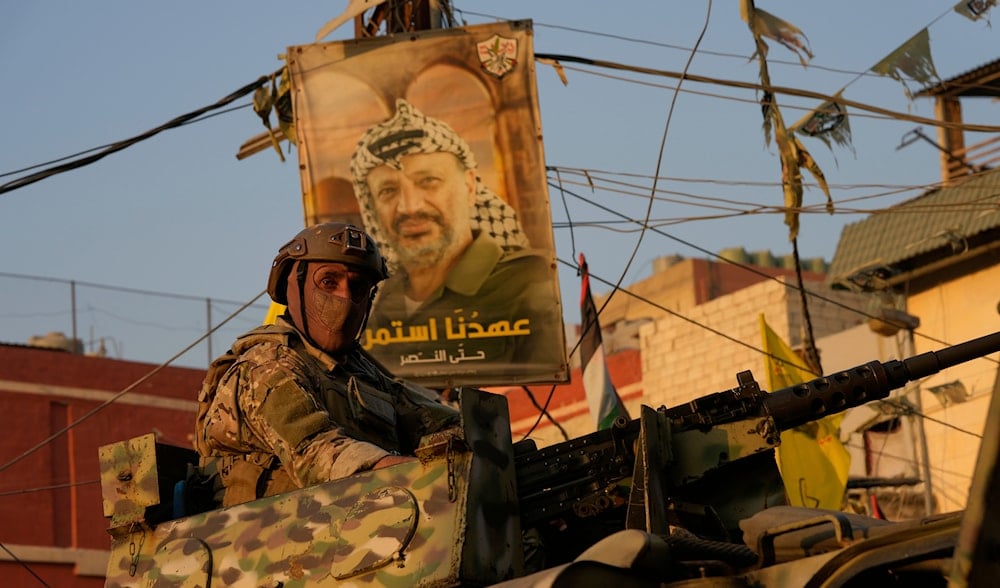Palestinian security hands Lebanese army weapons from Burj al-Barajneh
The Palestinian Authority begins handing over weapons from Lebanon’s camps to the Lebanese Army, while factions stress arms remain for resisting the occupation.
-

A Lebanese soldier sits on an armored personnel carrier at the entrance of Burj al-Barajneh Palestinian refugee camp where Palestinian factions handed over weapons to the Lebanese army, in Beirut, Aug. 21, 2025. (AP)
Palestinian Authority handed over a batch of weapons to the Lebanese Army in Burj al-Barajneh camp, south of Beirut, Al Mayadeen's correspondent reported on Thursday.
The Palestinian presidency confirmed the start of the process of transferring weapons from refugee camps in Lebanon to the Lebanese Army.
According to Ramiz Dameshkiyeh, head of the Lebanese-Palestinian Dialogue Committee, “The first stage of handing over weapons from inside the Palestinian camps begins today, starting with Burj al-Barajneh in Beirut, where the batch will be placed under the custody of the Lebanese Army.”
Lebanese Prime Minister Nawaf Salam welcomed the step, noting that the process “will continue with additional deliveries in the coming weeks, starting from Burj al-Barajneh and extending to other camps.”
أرحّب بانطلاق عملية تسليم السلاح الفلسطيني التي بدأت اليوم في مخيم برج البراجنة في بيروت، حيث جرى تسليم دفعة اولى من السلاح ووضعها في عهدة الجيش اللبناني، على ان تستكمل هذه العملية بتسليم دفعات اخرى في الأسابيع المقبلة من مخيم برج البراجنة وباقي المخيمات. pic.twitter.com/ykTRaUelj1
— Nawaf Salam نواف سلام (@nawafsalam) August 21, 2025
US envoy to Beirut, Thomas Barrack, also expressed congratulations to the Lebanese government and the Fatah movement on what he described as a voluntary disarmament agreement in the Beirut camps.
Palestinian factions: Weapons are for confronting the occupation
In a joint statement, Palestinian factions in Lebanon stressed that developments inside Burj al-Barajneh are “an internal organizational matter related to Fatah,” asserting that they are not connected to the issue of Palestinian weapons in the camps.
The factions reaffirmed their “permanent commitment to the security and stability of our camps and their surroundings, full respect for Lebanese law, and appreciation of the sovereignty of the Lebanese state and its institutions.” They further emphasized strengthening fraternal ties between the Palestinian people and the Lebanese people.
The statement added, “Our weapons will remain as long as the occupation sits on the land of Palestine, and they will only be used to confront the Zionist enemy until our people achieve their right of return, freedom, and the establishment of their independent state on their land.”
Disarmament strips Lebanon of defensive capabilities: Hezbollah
As the United States continues exerting pressure on all armed factions in Lebanon to surrender their weapons, the Islamic Resistance in Lebanon, Hezbollah, has repeatedly affirmed that its arms are not up for negotiation.
Hezbollah Secretary-General Sheikh Naim Qassem strongly slammed the Lebanese government’s August 5 decision during a ceremony in Baalbek marking the Arbaeen of Imam Hussein, saying it strips Lebanon of its defensive capabilities amid ongoing hostilities and facilitates the killing of Resistance fighters and their families.
Lebanon’s Prime Minister Nawaf Salam announced on August 5 that the Cabinet has formally assigned the Lebanese Army to draft a comprehensive plan aimed at consolidating arms under state control by the end of 2025. The army is expected to submit the plan for Cabinet review no later than August 31.
Sheikh Qassem described the decision as “dangerous” and a violation of Lebanon’s social cohesion, warning that it “exposes the country to a very serious crisis.”
He accused the government of carrying out “a US-Israeli scheme to dismantle the resistance, even at the cost of plunging Lebanon into civil war and fueling internal strife.”
Elsewhere in his remarks, Sheikh Qassem also referenced Israeli expansionist ambitions, "Have you heard of Netanyahu’s plan to establish a ‘Greater Israel’? What can you say about this? What are you doing about it?"
Read more: Arab states, League, condemn Netanyahu's 'Greater Israel' vision

 3 Min Read
3 Min Read










